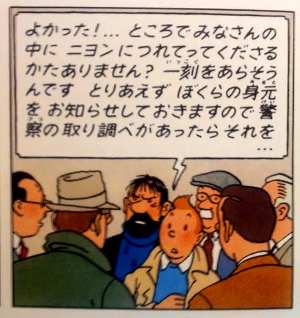Yep, I'm reading a lot of Tintin in Japanese recently, and he keeps throwing me curve balls with the language. Here's another one.
The situation is that the car he was in has been run off the road into a small lake. A few people have gathered around to see if he's okay, and he asks if there is anyone in the group who can drive him the rest of the way to Nyon (a small city in Switzerland).
Here's how he asks:

The part I'm wondering about is where he says 「ところでみなさんの中{なか}にニヨンにつれってくださるかたありません?」
Unless I'm missing something, he is using ありません, the negative form of ある, to refer to people. I was taught that one should use いる for people, and that it would be rude to use ある, because of the obvious implication that you are referring to them as inanimate objects.
Especially since he is asking for a considerable favour from strangers, shouldn't Tintin use いる?
Why did the translator opt to use ある?
Bonus question: Could Tintin have used おりません in this situation? Keigo always trips me up, but I thought おる was a more polite way of saying いる...? I'm not sure if おる is humble or not, and if it would imply he was being humble or if it would impose humbleness on the people he was talking to (and therefore not fit).
